Breach of Contract Case Study: Analyzing Buyer Claims and Remedies
VerifiedAdded on 2022/11/26
|5
|1167
|59
Case Study
AI Summary
This case study analyzes a breach of contract scenario where a seller refuses to sell a car to a buyer after initially accepting a partial payment. The study examines the buyer's potential claims against the seller, focusing on the elements of offer, acceptance, and consideration. It also explores the seller's possible defenses, such as revocation of the offer or the argument that no contract was formed. Furthermore, the study discusses the remedies available to the buyer if they succeed in their lawsuit, including recession of the contract, damages (liquidated and unliquidated), and specific performance. The analysis considers the types of damages the buyer can claim, such as expenses incurred, while excluding speculative profits. Desklib provides this and other solved assignments for students.
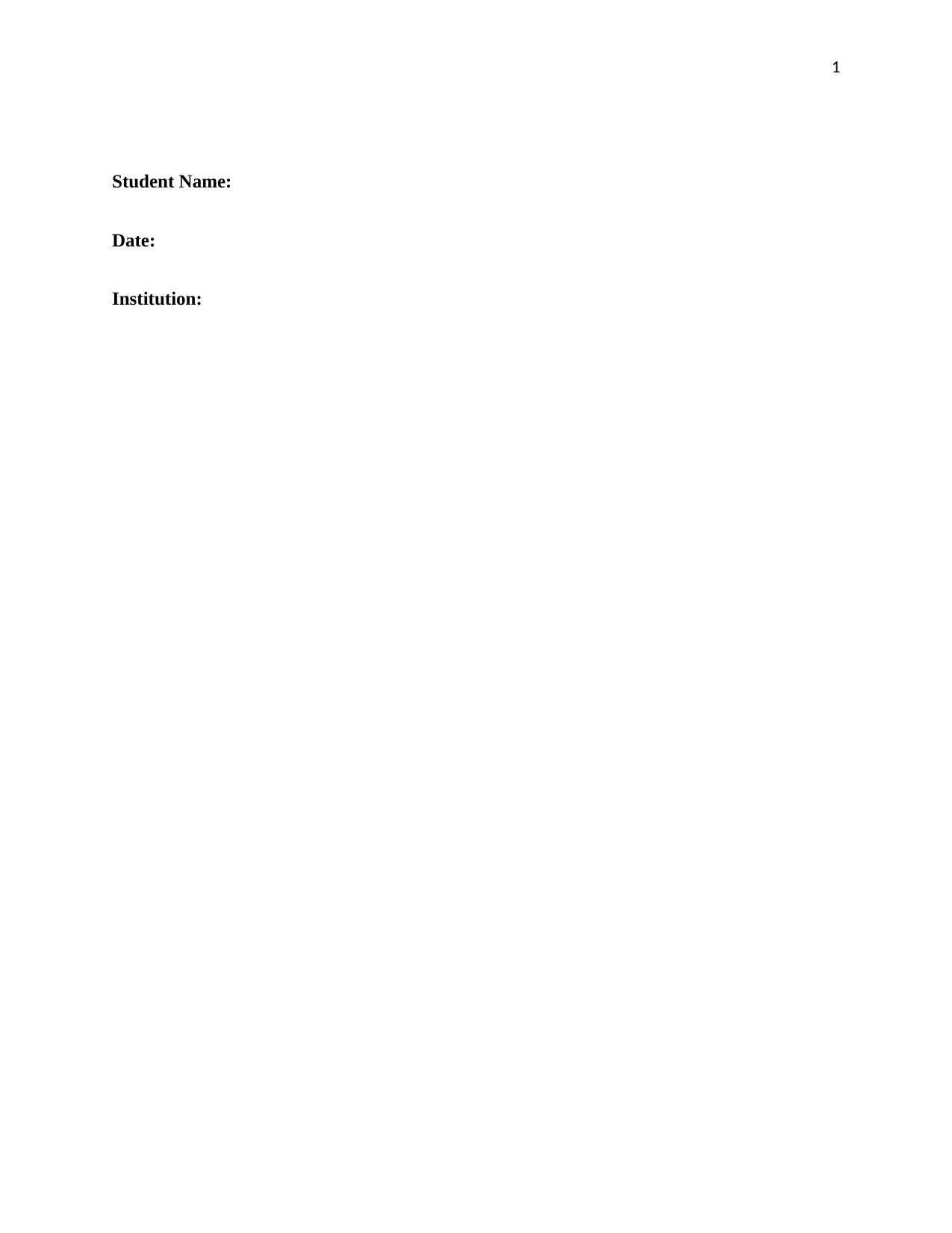
1
Student Name:
Date:
Institution:
Student Name:
Date:
Institution:
Paraphrase This Document
Need a fresh take? Get an instant paraphrase of this document with our AI Paraphraser
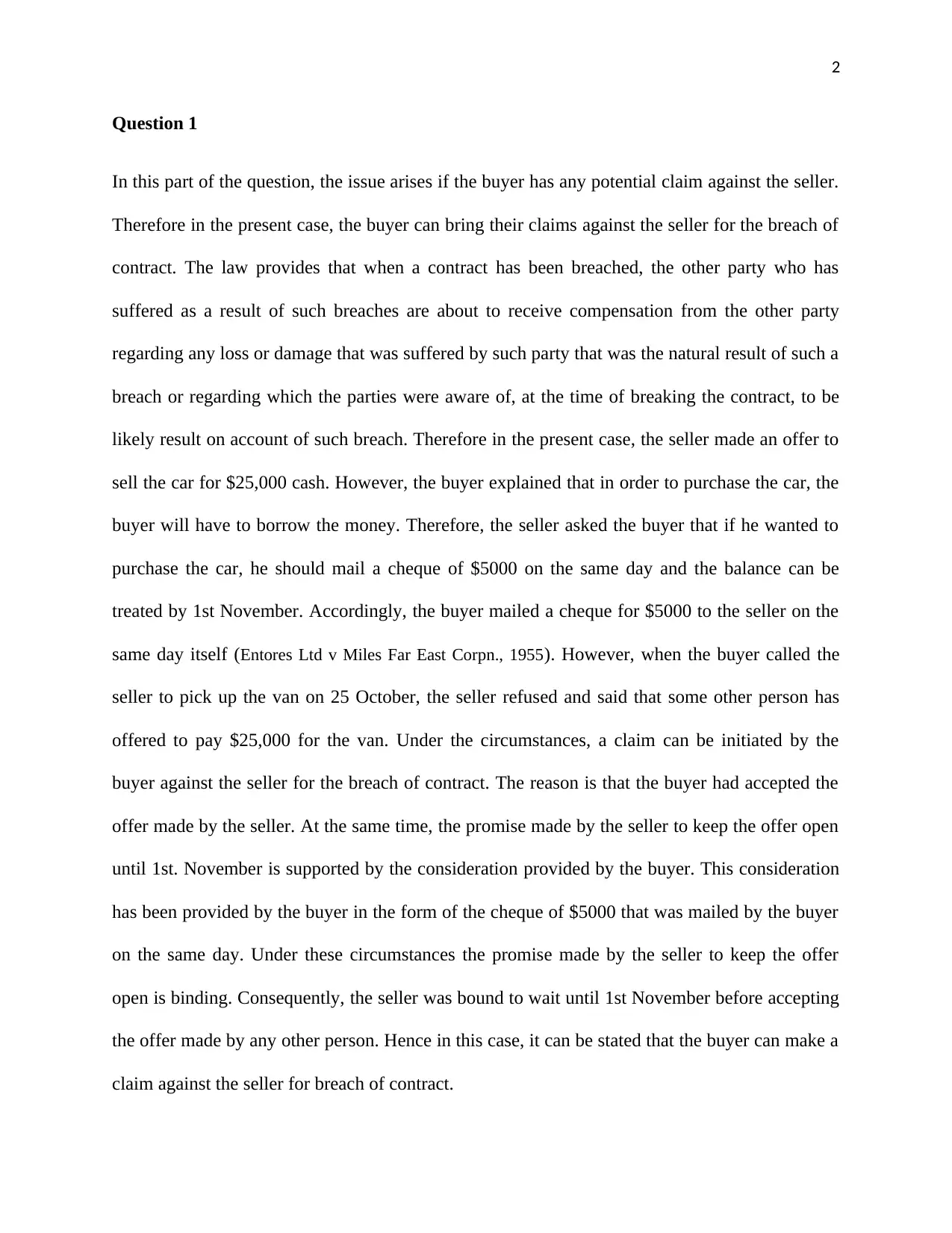
2
Question 1
In this part of the question, the issue arises if the buyer has any potential claim against the seller.
Therefore in the present case, the buyer can bring their claims against the seller for the breach of
contract. The law provides that when a contract has been breached, the other party who has
suffered as a result of such breaches are about to receive compensation from the other party
regarding any loss or damage that was suffered by such party that was the natural result of such a
breach or regarding which the parties were aware of, at the time of breaking the contract, to be
likely result on account of such breach. Therefore in the present case, the seller made an offer to
sell the car for $25,000 cash. However, the buyer explained that in order to purchase the car, the
buyer will have to borrow the money. Therefore, the seller asked the buyer that if he wanted to
purchase the car, he should mail a cheque of $5000 on the same day and the balance can be
treated by 1st November. Accordingly, the buyer mailed a cheque for $5000 to the seller on the
same day itself (Entores Ltd v Miles Far East Corpn., 1955). However, when the buyer called the
seller to pick up the van on 25 October, the seller refused and said that some other person has
offered to pay $25,000 for the van. Under the circumstances, a claim can be initiated by the
buyer against the seller for the breach of contract. The reason is that the buyer had accepted the
offer made by the seller. At the same time, the promise made by the seller to keep the offer open
until 1st. November is supported by the consideration provided by the buyer. This consideration
has been provided by the buyer in the form of the cheque of $5000 that was mailed by the buyer
on the same day. Under these circumstances the promise made by the seller to keep the offer
open is binding. Consequently, the seller was bound to wait until 1st November before accepting
the offer made by any other person. Hence in this case, it can be stated that the buyer can make a
claim against the seller for breach of contract.
Question 1
In this part of the question, the issue arises if the buyer has any potential claim against the seller.
Therefore in the present case, the buyer can bring their claims against the seller for the breach of
contract. The law provides that when a contract has been breached, the other party who has
suffered as a result of such breaches are about to receive compensation from the other party
regarding any loss or damage that was suffered by such party that was the natural result of such a
breach or regarding which the parties were aware of, at the time of breaking the contract, to be
likely result on account of such breach. Therefore in the present case, the seller made an offer to
sell the car for $25,000 cash. However, the buyer explained that in order to purchase the car, the
buyer will have to borrow the money. Therefore, the seller asked the buyer that if he wanted to
purchase the car, he should mail a cheque of $5000 on the same day and the balance can be
treated by 1st November. Accordingly, the buyer mailed a cheque for $5000 to the seller on the
same day itself (Entores Ltd v Miles Far East Corpn., 1955). However, when the buyer called the
seller to pick up the van on 25 October, the seller refused and said that some other person has
offered to pay $25,000 for the van. Under the circumstances, a claim can be initiated by the
buyer against the seller for the breach of contract. The reason is that the buyer had accepted the
offer made by the seller. At the same time, the promise made by the seller to keep the offer open
until 1st. November is supported by the consideration provided by the buyer. This consideration
has been provided by the buyer in the form of the cheque of $5000 that was mailed by the buyer
on the same day. Under these circumstances the promise made by the seller to keep the offer
open is binding. Consequently, the seller was bound to wait until 1st November before accepting
the offer made by any other person. Hence in this case, it can be stated that the buyer can make a
claim against the seller for breach of contract.
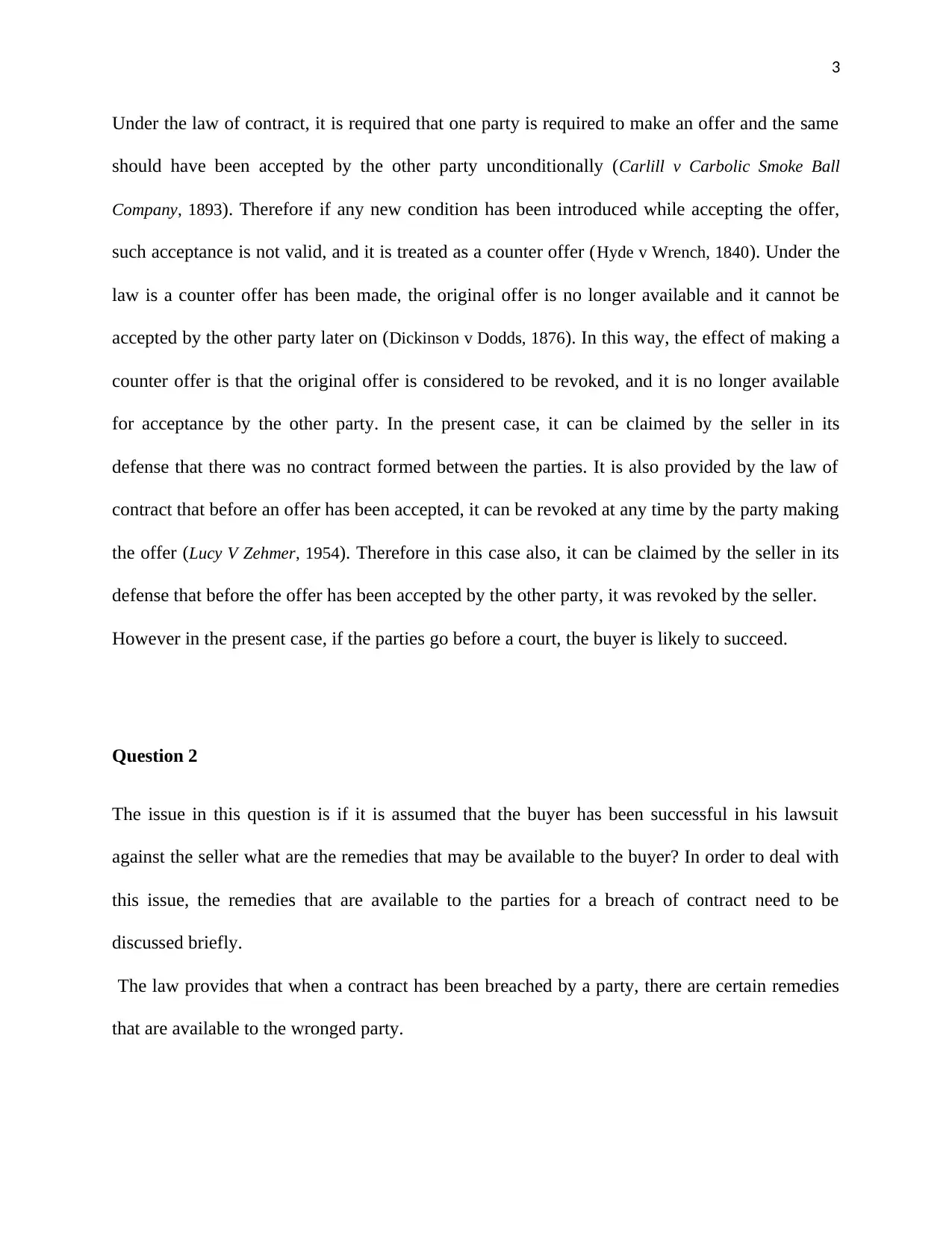
3
Under the law of contract, it is required that one party is required to make an offer and the same
should have been accepted by the other party unconditionally (Carlill v Carbolic Smoke Ball
Company, 1893). Therefore if any new condition has been introduced while accepting the offer,
such acceptance is not valid, and it is treated as a counter offer (Hyde v Wrench, 1840). Under the
law is a counter offer has been made, the original offer is no longer available and it cannot be
accepted by the other party later on (Dickinson v Dodds, 1876). In this way, the effect of making a
counter offer is that the original offer is considered to be revoked, and it is no longer available
for acceptance by the other party. In the present case, it can be claimed by the seller in its
defense that there was no contract formed between the parties. It is also provided by the law of
contract that before an offer has been accepted, it can be revoked at any time by the party making
the offer (Lucy V Zehmer, 1954). Therefore in this case also, it can be claimed by the seller in its
defense that before the offer has been accepted by the other party, it was revoked by the seller.
However in the present case, if the parties go before a court, the buyer is likely to succeed.
Question 2
The issue in this question is if it is assumed that the buyer has been successful in his lawsuit
against the seller what are the remedies that may be available to the buyer? In order to deal with
this issue, the remedies that are available to the parties for a breach of contract need to be
discussed briefly.
The law provides that when a contract has been breached by a party, there are certain remedies
that are available to the wronged party.
Under the law of contract, it is required that one party is required to make an offer and the same
should have been accepted by the other party unconditionally (Carlill v Carbolic Smoke Ball
Company, 1893). Therefore if any new condition has been introduced while accepting the offer,
such acceptance is not valid, and it is treated as a counter offer (Hyde v Wrench, 1840). Under the
law is a counter offer has been made, the original offer is no longer available and it cannot be
accepted by the other party later on (Dickinson v Dodds, 1876). In this way, the effect of making a
counter offer is that the original offer is considered to be revoked, and it is no longer available
for acceptance by the other party. In the present case, it can be claimed by the seller in its
defense that there was no contract formed between the parties. It is also provided by the law of
contract that before an offer has been accepted, it can be revoked at any time by the party making
the offer (Lucy V Zehmer, 1954). Therefore in this case also, it can be claimed by the seller in its
defense that before the offer has been accepted by the other party, it was revoked by the seller.
However in the present case, if the parties go before a court, the buyer is likely to succeed.
Question 2
The issue in this question is if it is assumed that the buyer has been successful in his lawsuit
against the seller what are the remedies that may be available to the buyer? In order to deal with
this issue, the remedies that are available to the parties for a breach of contract need to be
discussed briefly.
The law provides that when a contract has been breached by a party, there are certain remedies
that are available to the wronged party.
⊘ This is a preview!⊘
Do you want full access?
Subscribe today to unlock all pages.

Trusted by 1+ million students worldwide
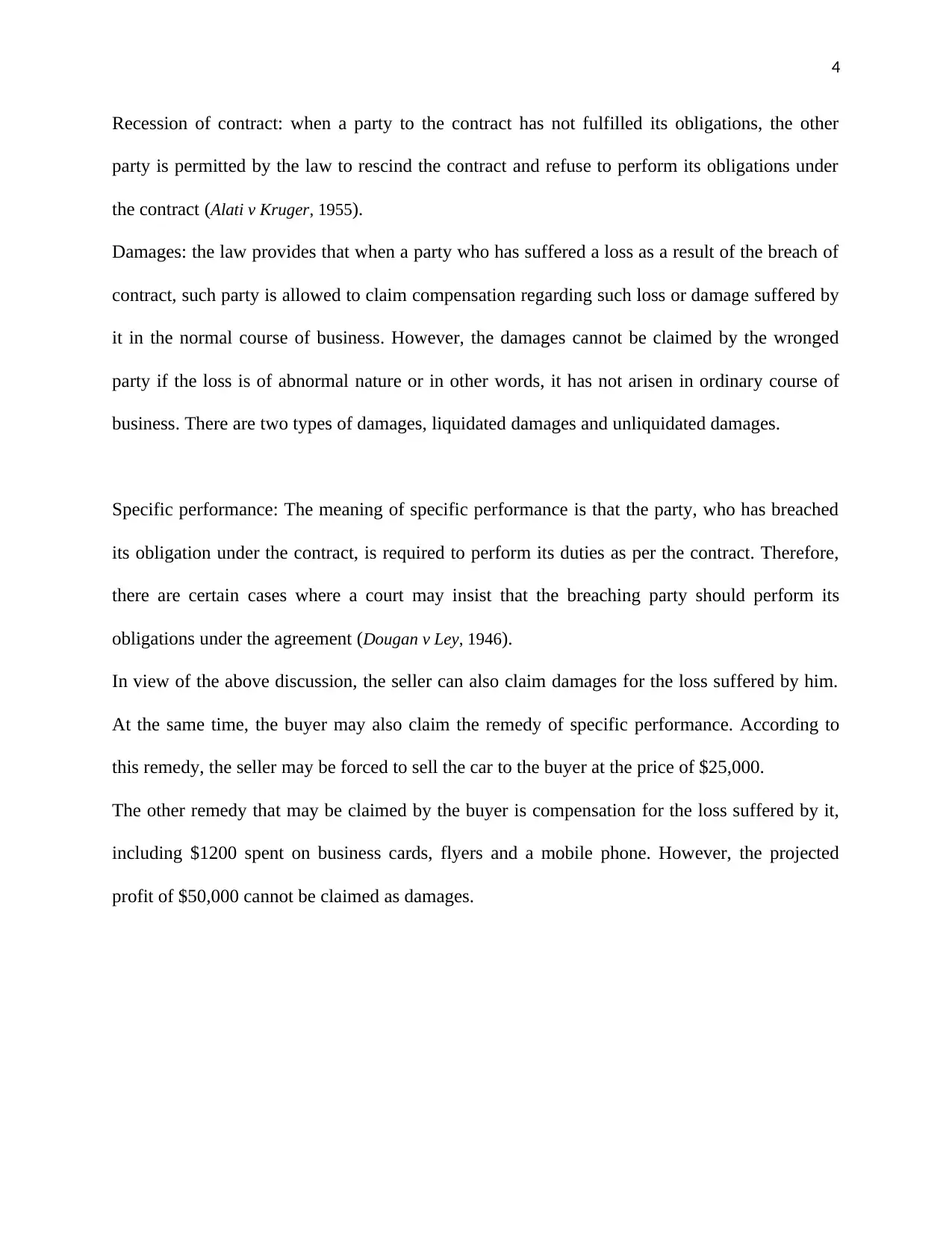
4
Recession of contract: when a party to the contract has not fulfilled its obligations, the other
party is permitted by the law to rescind the contract and refuse to perform its obligations under
the contract (Alati v Kruger, 1955).
Damages: the law provides that when a party who has suffered a loss as a result of the breach of
contract, such party is allowed to claim compensation regarding such loss or damage suffered by
it in the normal course of business. However, the damages cannot be claimed by the wronged
party if the loss is of abnormal nature or in other words, it has not arisen in ordinary course of
business. There are two types of damages, liquidated damages and unliquidated damages.
Specific performance: The meaning of specific performance is that the party, who has breached
its obligation under the contract, is required to perform its duties as per the contract. Therefore,
there are certain cases where a court may insist that the breaching party should perform its
obligations under the agreement (Dougan v Ley, 1946).
In view of the above discussion, the seller can also claim damages for the loss suffered by him.
At the same time, the buyer may also claim the remedy of specific performance. According to
this remedy, the seller may be forced to sell the car to the buyer at the price of $25,000.
The other remedy that may be claimed by the buyer is compensation for the loss suffered by it,
including $1200 spent on business cards, flyers and a mobile phone. However, the projected
profit of $50,000 cannot be claimed as damages.
Recession of contract: when a party to the contract has not fulfilled its obligations, the other
party is permitted by the law to rescind the contract and refuse to perform its obligations under
the contract (Alati v Kruger, 1955).
Damages: the law provides that when a party who has suffered a loss as a result of the breach of
contract, such party is allowed to claim compensation regarding such loss or damage suffered by
it in the normal course of business. However, the damages cannot be claimed by the wronged
party if the loss is of abnormal nature or in other words, it has not arisen in ordinary course of
business. There are two types of damages, liquidated damages and unliquidated damages.
Specific performance: The meaning of specific performance is that the party, who has breached
its obligation under the contract, is required to perform its duties as per the contract. Therefore,
there are certain cases where a court may insist that the breaching party should perform its
obligations under the agreement (Dougan v Ley, 1946).
In view of the above discussion, the seller can also claim damages for the loss suffered by him.
At the same time, the buyer may also claim the remedy of specific performance. According to
this remedy, the seller may be forced to sell the car to the buyer at the price of $25,000.
The other remedy that may be claimed by the buyer is compensation for the loss suffered by it,
including $1200 spent on business cards, flyers and a mobile phone. However, the projected
profit of $50,000 cannot be claimed as damages.
Paraphrase This Document
Need a fresh take? Get an instant paraphrase of this document with our AI Paraphraser
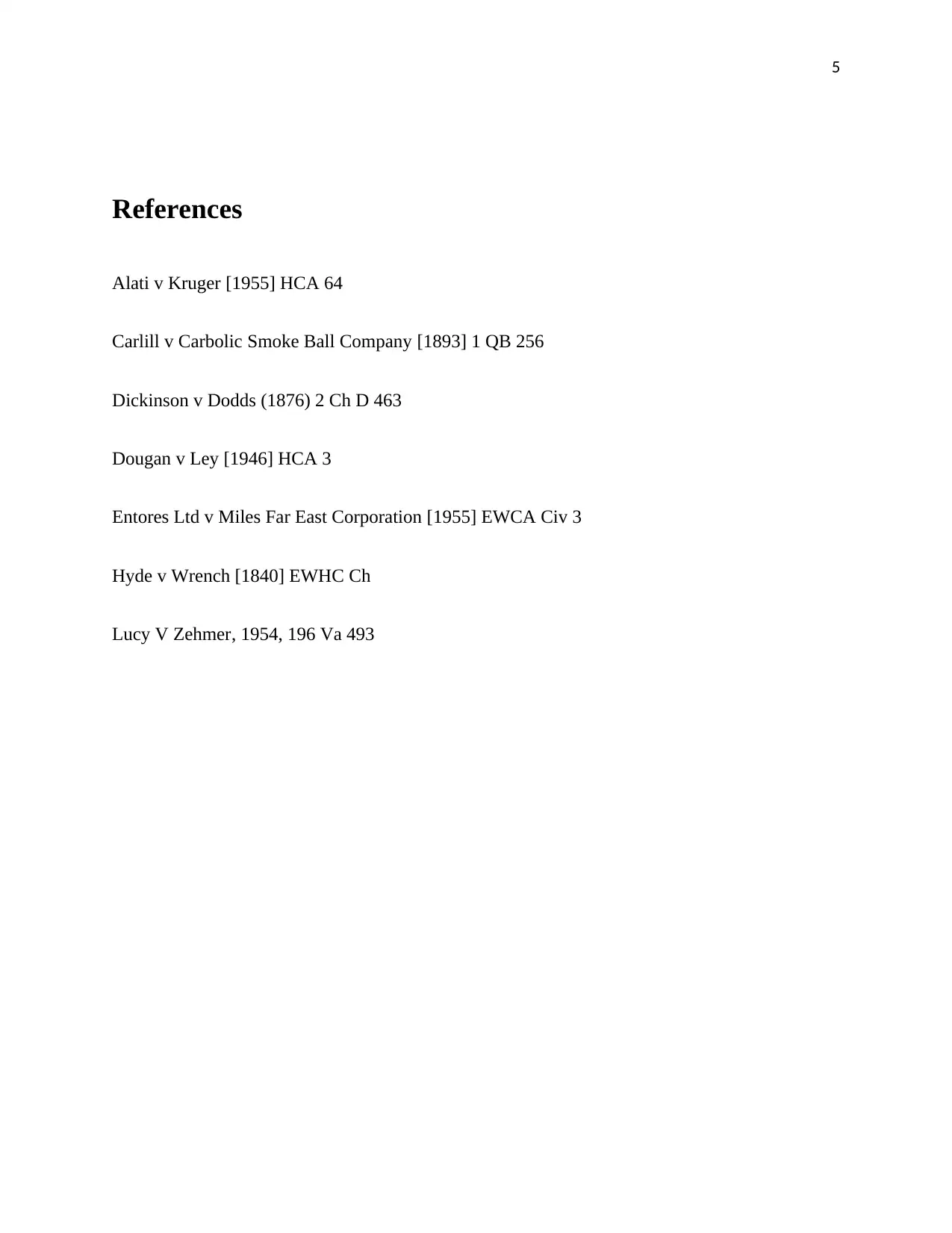
5
References
Alati v Kruger [1955] HCA 64
Carlill v Carbolic Smoke Ball Company [1893] 1 QB 256
Dickinson v Dodds (1876) 2 Ch D 463
Dougan v Ley [1946] HCA 3
Entores Ltd v Miles Far East Corporation [1955] EWCA Civ 3
Hyde v Wrench [1840] EWHC Ch
Lucy V Zehmer, 1954, 196 Va 493
References
Alati v Kruger [1955] HCA 64
Carlill v Carbolic Smoke Ball Company [1893] 1 QB 256
Dickinson v Dodds (1876) 2 Ch D 463
Dougan v Ley [1946] HCA 3
Entores Ltd v Miles Far East Corporation [1955] EWCA Civ 3
Hyde v Wrench [1840] EWHC Ch
Lucy V Zehmer, 1954, 196 Va 493
1 out of 5
Related Documents
Your All-in-One AI-Powered Toolkit for Academic Success.
+13062052269
info@desklib.com
Available 24*7 on WhatsApp / Email
![[object Object]](/_next/static/media/star-bottom.7253800d.svg)
Unlock your academic potential
Copyright © 2020–2026 A2Z Services. All Rights Reserved. Developed and managed by ZUCOL.





